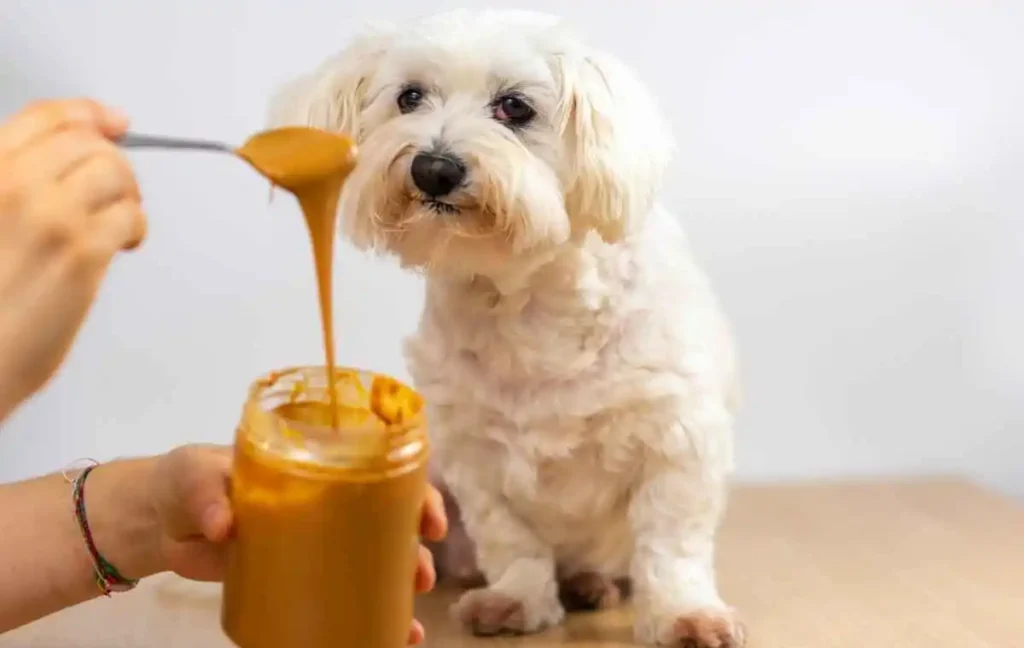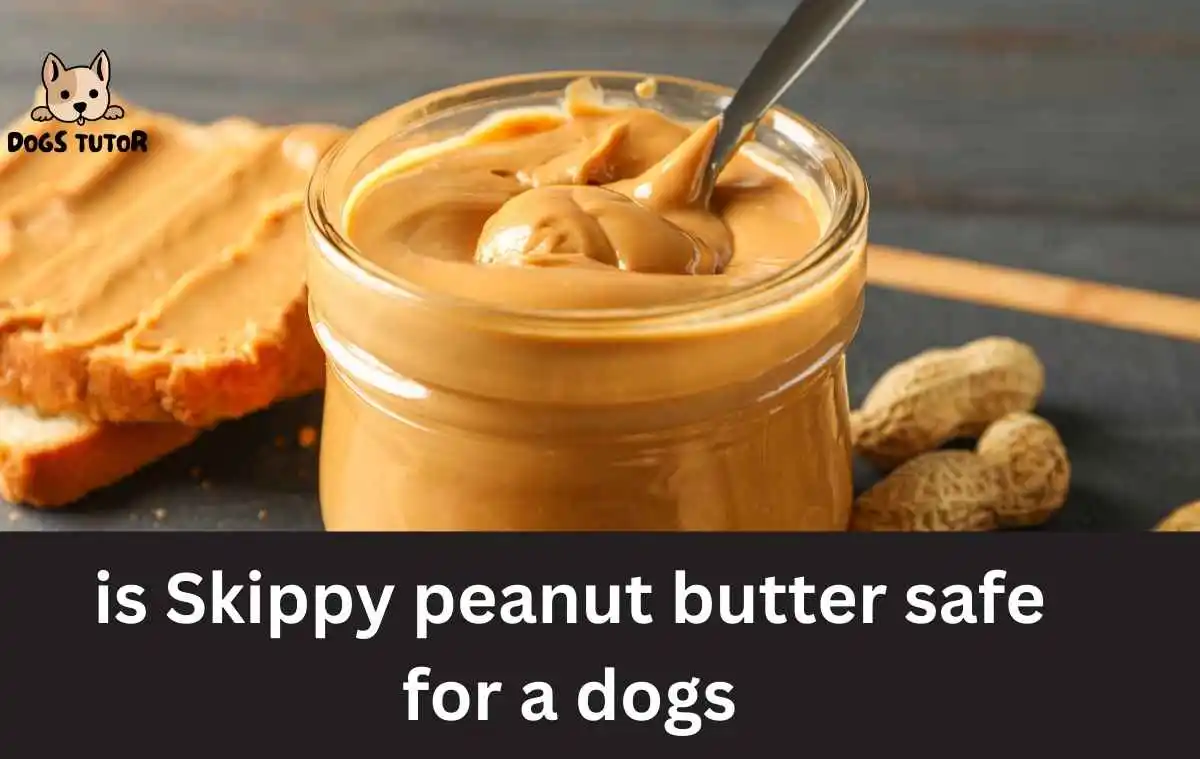Yes, Skippy peanut butter is safe for a dogs. Peanut butters contain high in fat and calories. Ones with added sugars, salt or xylitol aren’t good for dog.
Like people, some dog can have peanut allergies. Watch dog closely the first few times he tries it. Classic Skippy usually only has peanuts which makes it safer than flavored kinds.
The best thing is only giving a tiny spoonful maybe once or twice a week as a special snack. Always supervise mealtimes too.
How to Feed Peanut Butter to Dogs
Here are some tips for feeding peanut butter to your dog:
Small Amount– The amount will depend on your dog’s size. Too much at once can upset stomach.
Supervision – Some dogs will try to eat the whole thing too fast. Go slowly and take the peanut butter away if they start gobbling.
Hydration – Give water before and after peanut butter so it helps with digestion instead of sitting in their stomach. The fats and proteins need to be broken down.
Type – Look for plain, natural peanut butter without added sugar, salt or oil. Xylitol is toxic to dogs so check labels carefully.
Frequency – Once or twice a week as a treat is sufficient. It’s high in calories so don’t overdo the portions or frequency.
Dental benefits – Letting your dog lick it off your finger or chew helps scrape plaque and tartar from their teeth. Brush afterwards if needed.
Training – Peanut butter can be used to reward desired behaviors during lessons by smearing a small amount on your finger.
Safety – Watch for signs like diarrhea from too much. Store opened jars away from reach. Wipe your dog’s mouth when finished.
is skippy peanut butter safe for a dogs
Most dogs enjoy peanut butter as an occasional treat, it’s best to take in moderation. But people worried and think about Is Skippy peanut butter safe for a dogs. Skippy peanut butter can be part of a routine, but should not replace your dogs primary dietary needs.
Too much risks weight gain or pancreatitis. Also check the ingredients, as added sugars, xylitol or salt provide no nutrition.
Classic Skippy varieties avoid these extras, making them a safer occasional choice. Always start with a small taste to watch for allergy signs like an upset tummy. Supervise eating in case of choking too.
As with any new food, I’d gently suggest running it by your vet. They can provide the best guidance on your dog’s calorie requirements and any dietary limitations. A treat is fine now and then, say once or twice weekly with a spoonful.
Overall, peanut butter can bring your good boy much enjoyment when enjoyed lovingly as intended. With moderation and care for his health.
Is peanut butter has xylitol
It does not contain xylitol . Xylitol is a sugar substitute found in some sugar-free human foods, but it is not an ingredient in regular peanut butter which gets its natural sweetness from peanuts alone.
Provided it’s fed in moderation as an occasional treat, plain peanut butter without added flavors or sugars like Skippy original variety should be safe for most dogs.
The key things to watch out for are portion size and fat/calorie content. Too much too often could cause weight gain or pancreatitis in some dogs. But in small amounts as a rare snack, peanut butter itself poses minimal risk.
How to choose a best peanut butter for dog

Ingredients to Look For
Opt for varieties that are just one ingredient – peanuts. These will be the healthiest, simplest options. Some other ingredients to consider are: Peanuts . Should be the first and primary ingredient. Salt . In moderation is okay, but watch out for high-sodium butters.
Sugar . Avoid varieties with added sugars which provide empty calories.
Vegetable oil . Helps processing but adds fat, so go for minimal oil options.
Xylitol . ABSOLUTELY avoid any peanut butter containing this artificial sweetener, as it is toxic to dogs.
Focus on peanut butter with peanuts as the sole ingredient or peanuts topped with a minimal amount of salt for taste. Simple is best when choosing brands for your pup.
Consistency
The texture of peanut butter can also determine its quality. While your dog won’t likely care, these qualities ensure the best nutrition: Chunky .
Provides chewable peanut pieces that deliver fiber, but also has higher fat content than creamy. Moderation advised. Creamy . Easier for dogs to lick up but lacks fiber of chunky varieties. A good daily option in moderation.
Fat and Calories
Like humans, overweight and obese dogs are prone to health problems. Choosing a peanut butter low in additives helps control calories: Fat content . Around 50-65% of calories in natural peanut butter come from fat. Look to stay under 15g fat per 2 Tbsp serving. Calories .
Aim for less than 90 calories per 2 Tbsp serving of peanut butter to use as an occasional treat for dogs. Overall, simple, minimally processed peanut butters with just peanuts or peanuts and salt provide the healthiest fats and fewest empty calories when consumed in moderation.
Additional Factors
Some other aspects that can influence your peanut butter decision include: Natural vs. conventional . Due to higher antioxidant levels, natural is the bette pick if possible. Just avoid varieties with added sugars. Crunchy vs. smooth .
While crunchy adds texture for dogs, it may pose a choking hazard. Smooth is generally safest. Organic . May have less pesticide exposure, but non-GMO and conventional butters prepared safely are fine too. Price . Premium butters can cost more but provide higher quality ingredients. Sales and store brands work too in a pinch.
With some comparison shopping while considering ingredients, texture and calories, you’re sure to find a peanut butter a four-legged buddy would approve of for occasional canine consumption.
Their health is top priority when selecting a treat. In moderation and reading labels closely, sharing the right peanut butter can be a fun part of bonding with your furry best friend. The extra effort ensures only the best nutrition gets passed to deserving dogs.
What Ingredients make peanut butter unsafe and unhealthy for dogs?
- Xylitol . This artificial sweetener is toxic to dogs even in small amounts. It can cause a dangerous drop in blood sugar and potentially liver damage. Always check labels for xylitol.
- Added sugars . Too much sugar is unhealthy for dogs and offers empty calories. Look for varieties without sugar listed in the top ingredients.
- Salt . Too much salt in the diet has been linked to health issues in dogs. Limit saline treats and choose lower sodium butters.
- Vegetable or other added oils . These increase fat and calories without adding much nutrition. Opt for minimal or no added oils.
- Preservatives . Dogs don’t need extra chemicals and some preservatives have raised safety questions. Better to choose without.
- High fat content . While peanut butter naturally contains fat, “ultra-creamy” styles are very high. Moderation is key with higher fat butters.
- Spices/flavors . Unnecessary additives that could cause tummy trouble in sensitive pups. Basic is best.
- Poor quality peanuts . Rancid or low-grade nuts may harbor mold, which can sicken dogs. Choose reputable brands.
When feeding dogs peanut butter, simpler varieties with just peanuts, maybe a touch of salt and no other extras added are generally the safest, healthiest options.
